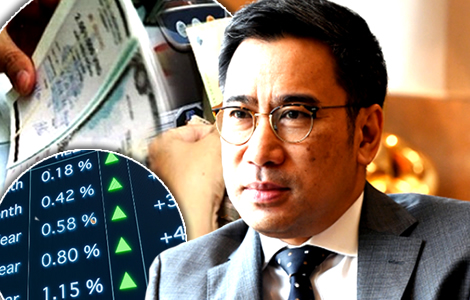With a colossal private sector debt, experts warn of a potential economic implosion. The finance ministry closely monitors the situation, hinting at a possible emergency fund. As credit conditions tighten and liquidity concerns rise, Thailand’s economic resilience is put to the test.
Financial market analysts fretted this week that Thailand’s corporate sector bond market could trigger a wider financial crisis. The issue arose this week when one of the country’s leading firms, Italian-Thai Development (ITD) moved to postpone repayment on a bond due this year. In the midst of this came another spat between Prime Minister Srettha Thavisin and Bank of Thailand boss Sethaput Suthiwartnarueput over the bank’s interest rate policy. The smell of danger comes as the country comes to grips with its enormous extent of private sector debt.

There are fears Thailand could be facing another financial crisis. At this time, the threat is coming from within the corporate bond sector.
At length, most of the attention this week was on the Prime Minister’s spat with the Bank of Thailand Governor Sethaput Suthiwartnarueput. However, on Monday, one of Thailand’s largest firms announced a delay in bond repayments.
Italian-Thai Development (ITD) announced a two-year postponement of payments on its bonds worth ฿14.45 billion, due in 2024. At the same time, analysts expressed fears that it may be just the beginning.
Finance ministry says the bond market problem is limited. Situation is being intensively monitored following Monday’s shock announcement by Italian-Thai
Afterwards, the Ministry of Finance announced that it was monitoring the situation. Simultaneously, Deputy Minister of Finance Julapun Amornvivat even suggested an emergency fund may be made available.
Later in the week, the government suggested the problem was limited to a number of companies. These include the JKN Global Group, an international firm that owns the Miss Universe franchise. Previously it has sought protection from the Central Bankruptcy Court in Bangkok. The media firm is in the process of a ‘business rehabilitation’ just as Thai Airways did in May 2020.
Thai Airways files for bankruptcy and gets court protection here as heavyweights are brought on board
Passenger complaint turbulence as Thai Airways appears to plot sky-high Dreamliner expansion
Nonetheless, key financial pundits warn that there is a possibility of a financial implosion if the problem in Thai firms proves to be more widespread.
Many large Thai firms who have had access to the bond market, have weathered a tough trading period during the country’s pandemic emergency. In the meantime, they are operating in an economy where cash flow is tightening.
Tightening credit and liquidity conditions in a market that turned negative towards the private bond market. Fears for the refinancing of such facilities
At the same time, credit watchdogs have become more wary of private commercial bonds. Especially since the banking crisis in both the United States and China last year.
Additionally, rising interest rates and a more cautious market have constrained sources of finance.
Significantly, it has also made refinancing such facilities extremely difficult.
Presently, concerns are rising with research analysts trying to fathom the extent of the exposure. Therefore it is now reliably suggested that approximately ฿ 4.7 trillion of bonds and papers are outstanding in respect of large Thai private firms.
In short and shockingly, this is roughly 32% of commercial banks’ corporate sector loan portfolio or 5% of Thailand’s overall private debt market.
At length, this is a massive vulnerability if more firms run into difficulty or have problems making bond repayments.
High praise for the Bank of Thailand’s stewardship of the Thai banking sector, it is robust and strong
After that, the issue becomes the government’s own finances.
Most analysts have praise for the Bank of Thailand’s stewardship of the banking system. With bumper profits of over ฿220 billion in 2023, there is consensus that this time, Thailand’s banking system is sound.
However, the next weakness could well be the nature of Thailand’s $118.8 billion total foreign borrowing, with $58 billion being short-term.
Total public debt in Thailand is far higher at 61% of GDP. That is ฿10.6 trillion or $303 billion.
Therefore, there are fears that if the short-term debt is not substantially renewed, it could have catastrophic consequences for the Thai economy.
Consequently, this also poses a threat to the Thai baht. The sum in question is not insignificant at ฿2.03 trillion.
Bank of Thailand has begun reining in household debt. However, the Thai economy is quite resilient and consumer confidence was still rising in December
While this is happening, the Bank of Thailand has begun its programme to rein in private borrowing and improve loan quality. This means even further constraints on cash flow and liquidity in an already difficult environment.
Nevertheless, the resilience of the Thai economy should not be underestimated.
Despite low growth but buoyed by foreign tourism, the country’s consumer index continues to rise.
In December it was up for the fifth month in a row. Actually, at 62, it is the highest level since before the pandemic began in March 2020.
However, financial analysts fear that a lack of cash in the system may impede the economy in 2024. The government and most agencies predict 3.2% growth and a 2 to 3% rise in exports.
Conversely, there is hope that US interest may fall later in 2024.
This would boost exports. In addition, it may also see capital flowing towards Asia although the dynamics of the world economy have become unpredictable.
A bond market crisis now would be a disaster. Ministers hoping for a lowering of US interest rates later in 2024 and strong capital inflow into markets
At any rate, this is what Prime Minister Srettha Thavisin and his ministers are hoping for. This is part of the government’s strategy.
Undoubtedly, a crisis in the bond market or heightened investors’ fears about Thailand’s stability right now would be disastrous.
On this, both Bank of Thailand Governor Sethaput Suthiwartnarueput and Mr Srettha are certainly in agreement.
Not surprisingly, the focus this week has been on the money taps and supply. The government argues that higher rates in the West are taking money out of the economy.
It means more pressure on borrowers including households and businesses. On the other hand, if loans are not available, the difference in the lending rate is moot for those seeking funding.
Tighter lending conditions in 2024 will add to the credit squeeze. Fears that a shortage of liquidity could hamper room for economic expansion
Figures from the end of last year showed money supply has only increased by 1.5%. Similarly, commercial banks’ loan growth rate came in at 1.4%. In the 6 months to the end of September, $11.8 billion in borrowed capital left Thailand’s shores. This trend is not at all compatible with the government’s expansionary plans.
Thailand was experiencing a credit crunch even before the Bank of Thailand began to tighten the screws in January. In April even more restrictive measures go into place obliging lenders to meet higher loan quality standards.
The fear is that a lack of confidence or a further loss of liquidity within the economy will strangle any potential for growth this year. Correspondingly, lower interest rates may be part of the problem as higher interest rates may be needed to attract capital.
Meanwhile, the evaporation of the bond market for big business is an immediate pressing concern. In summary, it exposes Thailand’s enormous debt load within its struggling private sector. In turn, this prompts closer scrutiny of the government’s finances.
PM queried elevated or rising interest rates against a backdrop of negative inflation towards the end of 2023, Central bank also concerned with stability
Prime Minister Srettha Thavisin, however, this week, openly opposed the BoT’s strategy on the policy rate.
Srettha strongly expressed his disapproval. Citing hardships for businesses and households, he pointed out the incongruence of raising interest rates amid prolonged negative inflation.
He urged relevant ministries to ensure fair prices for agricultural products.
Later in the week, at a meeting with the central bank boss Mr Sethaput, he advocated a reduction in interest rates to stimulate economic growth.
The BoT’s Monetary Policy Committee (MPC) has been at the forefront of the rate-hiking strategy. It increased the policy rate eight times since August 2022, reaching 2.5% in September 2023. In brief, the committee’s decisions aimed to control inflation, which peaked at 8% in 2022.
However, the upcoming MPC meeting on February 7 is awaited with anticipation. Stakeholders, including government officials and industry leaders, keenly anticipate the central bank’s response to a challenging economic environment.
Interest rates became a populist issue midweek with rhetoric demanding a fair deal for the borrower with consistently high bank profits, started by the PM
However, as well as being tasked with combating inflation the Bank of Thailand sees its primary mission as preserving financial stability. This means the country’s banks.
If the country is facing a private sector debt or bond crisis, then this concern becomes paramount. Higher interest rates allow banks more scope for profit while also attracting capital.
In contrast, politicians this week had a distinctly populist message. Not always a good idea in a troubled economy.
PM again attacks central bank on interest rates as deputy Finance Minister raises bond concerns
Deputy Prime Minister and Interior Minister Anutin Charnvirakul made a statement. He emphasised the need for the BoT to balance the growth of financial institutions with the quality of services provided to consumers.
Mr Anutin talked especially about the importance of fair competition among banks and justice for consumers. In addition, he emphasised the BoT’s role in responding to people’s needs and expanding access to funding.
Meeting between the PM and Bank of Thailand Governor at Government House. Mr Sethaput promised to explain the bank’s policy but clearly reserved its rights
In response to the prime minister’s concerns, the BoT governor, Sethaput Suthiwartnarueput, later met with Srettha Thavisin at Government House.
The duo discussed inflation and the interest rate situation. Despite the prime minister’s disapproval of the rate hike, Mr Sethaput maintained the BoT’s independence. He disclosed that the bank would explain the issue of interest rates and address negative bonds.
Against the backdrop of economic challenges, the Finance Ministry is closely monitoring potential issues with corporate debenture repayments.
Permanent Secretary Lavaron Sangsnit reassured the public that they, along with the Bank of Thailand and the Securities and Exchange Commission, are actively monitoring maturing debentures that may face default.
A recent evaluation highlighted only one company encountering difficulties in securing funds for debenture repayments. The ministry is prepared to take swift action if a default occurs. Mr Lavaron emphasised the capital market’s capability to maintain financial stability.
The delayed repayment of debentures by companies like Italian-Thai Development Plc (ITD) and JKN Global Group has sparked concern.
Prime Minister Srettha Thavisin is set to convene a meeting with the Finance Ministry and the central bank to address the issue. In short, the ministry will devise measures to tackle any potential defaults.
Join the Thai News forum, follow Thai Examiner on Facebook here
Receive all our stories as they come out on Telegram here
Follow Thai Examiner here
Further reading:
PM again attacks central bank on interest rates as deputy Finance Minister raises bond concerns
PM takes aim at the Bank of Thailand over interest rates despite Thailand’s lower borrowing costs
Steady as she goes growth and economic stability driven by a growth in US exports is all good news
Economy at crossroads: World Bank calls for structural reform to avert two decades of low growth
Fragile, weak economy sees central bank holding interest rates and reducing 2023 growth to 2.4%
Srettha’s crisis is not just an economic one, it is a ‘3D debt crisis’ that is strangling GDP growth
Zombie Thai firms holding back economic growth as they struggle just to pay interest on bank debt
Incoherent government economic policy clashes with Bank of Thailand’s efforts to rein in debt



















